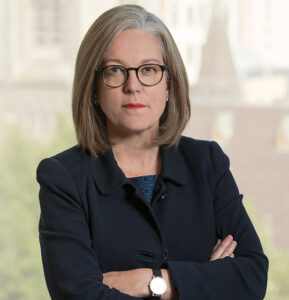
One of the seismic shifts in Australia’s public sector in the last thirty years has been the rise of women to senior positions, and the shattering of some, but not all, glass ceilings. Regulation is no different, and in recent years we have seen a generation of women rise to senior roles in regulatory agencies, including areas that have traditionally been male-dominated.
For International Women’s Day ANZSOG spoke with three of these women – Fair Work Ombudsman Sandra Parker, ASIC Deputy Chair Karen Chester and Rose Webb, deputy secretary of the Better Regulation Division and Commissioner of Fair Trading at NSW Department of Customer Service – to get their views on the craft of regulation, find out how their careers have unfolded and what work is yet to be done to achieve gender parity in regulation.
Regulators need to be able to work constructively with governments to interpret broad legislation in the public interest, as well as keeping aware of changing trends and emerging threats. All three women said that this challenge was one of the things that made regulation a fascinating part of the public service.
Ms Webb began her career as a lawyer but has spent the majority of her time in regulation, previously working as an executive general manager at the Australian Competition and Consumer Commission (ACCC) and as the CEO of the Hong Kong Competition Commission.

Rose Webb
“I started out as a lawyer, that was my skillset but what drew me to regulation was the opportunity to look at things from a broader perspective, not just the legal perspective of is it legal or illegal but the wider questions of what is in the public interest,” she said.
“I think regulation can sometimes get a little neglected because policy is often seen as a higher profile part of the public service. People do not realise how challenging and satisfying it is, and how important to getting policy to work.
“You’ll always have more things you could regulate than you can regulate, and you are always making decisions around what part of the legislation should I prioritise and which levers should I be pulling? You need to be able to keep that broader view of what you are trying to achieve,” she said.
Ms Parker – whose previous position was a Deputy Secretary in the federal Department of Jobs and Small Business said that regulation was a challenging field that all public servants should try, to broaden their experience.

Sandra Parker
“There are big career and personal advantages to having a diverse range of experiences across the public sector and I think this ultimately benefits the community” she said.
Ms Chester said her career had involved a full 360-degree circle – moving from a beginning as an economist at PM&C and Treasury, then to the private sector as CEO of Access Economics followed by several investment consultancy roles. In 2013, she returned to the public sector as Deputy Chair of the Productivity Commission, before becoming Deputy Chair of ASIC at the start of 2019.

Karen Chester
“It’s been an eclectic career but in a weird and wonderful way it’s been perfect preparation for ASIC with experience that is uniquely valuable for this role,” she said.
“To be a regulator you need to have a robust analytical framework, but also a professional semantic to apply it. You’re a decision-making machine. You need to know which levers to pull. You need to know how business works and the incentives from government that regulation can create.
“Regulators need to think about what the emerging threats and issues are, so it’s never a ‘set and forget’ situation.
“The ASIC Act requires us to take into account the public interest, as well as those of businesses and consumers, so it is a pretty broad lens through which to make decisions.”
She said that she had found all her work fulfilling in some ways but it was her work in the public sector at the start of her career, and in recent years at the Productivity Commission and ASIC, that had her ‘jumping out of bed every day’.
“I never set out to be a regulator but when I started to look at behavioural economics I understood the power of a regulator doing it effectively, and that is the role of ASIC post-Hayne Royal Commission. We will have an impact on the wellbeing of thousands of people.”
Barriers to women in regulation
Ms Parker said that there had been a significant change in senior female representation during her time in the public service, and that senior leadership in workplace relations had gone from being ‘all blokes’ across unions, peak bodies, tribunals and policy departments to a situation where the last few Australian delegations to the International Labour Organisation had been all female.
Despite this, the issue of workplaces failing to adapt and recognise women’s caring responsibilities was still a barrier to women reaching senior positions.
“We can’t afford to stop looking at this issue, women are probably always going to have more of the caring responsibilities, at least in our lifetimes, and their careers can be impacted because of that,” she said
She said she did not believe that there was a particular style of ‘female leadership’.
“All the female leaders I’ve had have been quite different from each other and I think I have really benefited from that. It’s an individual thing and I can’t see a pattern.”
Ms Webb said she did not see regulation as being different to other organisations when it came to gender issues, and said she had 60 per cent female leadership in her division.
“In regulation there are some legacy issues, we recruited a lot of people who had a police background and that was a male-dominated group, but I think that is changing as regulation becomes more of a profession than part of law-enforcement,” she said.
Ms Webb said that organisations needed to take into account women’s work life balance – especially if it meant more working from home – and to move beyond using long hours in the office as the only way to judge performance.
She said women often brought skills of organisation and attention to detail, which were extremely important for regulators.
”I think most of the female leaders I’ve seen have been highly organised, whereas there are still good and effective male leaders whose offices are pretty chaotic. Beyond that there’s not a lot of difference between male and female leaders.”
Ms Chester said that there had been huge changes in the last 25-30 years towards workplace gender equity and more women in senior roles, which had stemmed from organisations moving to value outcomes, not hours worked.
“I am mindful of the women who came before me, at a time when childcare was not an industry. It took them so much longer to get where they got to.
“Are we there yet? No, we’ve got a long way to go, there are still the work/life issues, there are still biases that are unspoken, and issues at particular workplaces.”
However, Ms Chester said that women needed to make sure they made the most of the opportunities that were available, instead of defaulting to self-doubt when an opportunity arose.
“Women can put up their own speedbumps, stop signs and detours to their careers,” she said.
“In my career, when an opportunity came up I took it, and then worked out how I was going to do it. I didn’t overthink it, because I knew the boys didn’t.”
“When it comes to advancing women in ASIC, the key is making sure we have plenty of opportunities and encouraging women that we’ll support them in taking them. We need to make sure that people’s personal circumstances don’t get in the way of opportunities.
“I would say as a general piece of advice to women with caring roles or young children: don’t stay at a job you don’t enjoy because it’s ‘safe’. Consider other options, say ‘yes’ to new and more challenging roles and work out how to do it later.”
Staying independent and the importance of communication
One of the balances that regulators need to maintain is that of working with government, while keeping its independence to retain the confidence of both the regulated community and the public.
Ms Parker said that one of the challenges facing any regulator was not to become too isolated.
“Once you have built a positive relationship with the department and government, then you can have the hard conversations that occasionally need to be said.
“A key part of being independent and impartial is not to get engaged in policy discussions – you can’t get into those debates because you need to retain the confidence of your regulated community. You are there to implement policy once it has made its way to you.”
She said that despite the rhetorical differences between Labor and the Coalition on workplace issues, many areas are bipartisan in practice.
“There are different nuances and differences in language but they share the view that there should be minimum wages and workplace standards and that you need to enforce those minimum standards so that there is a level playing field for the majority of businesses.”
Ms Chester said that ASIC had moved to a position of consulting widely across the sector while guarding its independence.
“Independence doesn’t mean you can’t communicate with the government of the day. I think a ‘no surprises’ stance is a good thing, and we work with Treasury if we have concerns about policy issues.
“We consult with consumer groups and with some businesspeople who have expertise that we need to dip into. Five years ago we wouldn’t have done that because we thought it could compromise our independence, but we need to have the confidence to use these groups as a sounding board.”
Ms Webb said that it was important for regulators to remain independent but also to recognise the political context they worked in.
“Politicians cannot be allowed to influence investigations, but you assume that if politicians are raising a specific issue that there is some community experience or opinion behind it and you need to consider that seriously.”
Ms Chester said that communication should be a priority for regulators.
“It’s no use doing good regulation if you can’t communicate it – you lose the nudge and deterrence effects. You need to communicate to lay people and businesspeople and at ASIC we have made a conscious decision to talk like real people, not in legalese.”
Documents produced by ASIC are now the most readable among Commonwealth agencies, according to a report published in March 2021. Ethos CRS reviewed content from across 35 Federal Government bodies, with ASIC achieving the highest score.
Keeping the ‘COVID flexibility’ going
In 2020, all three women were at the head of organisations which faced major changes to their work as a result of COVID-19, and believe that the flexibility governments showed needs to be kept for the future.
Ms Parker said that COVID-19 brought both new demands on her team and the challenge of doing things differently.
“We had to change how we worked – for example we couldn’t do workplace inspections, which had been a fundamental part of our role. We were involved in regulating Jobkeeper payments, and are now looking at issues around vaccinations and what they mean for the workplace.
“In the beginning people in the community were really scared about the impact of the pandemic – we’ve simply never had another circumstance where people were not able to go to work. I think Jobkeeper settled everything down and although there were a few examples of poor behaviour, both by employers and workers, on the whole people behaved really well.”
Ms Webb said that said that COVID added more responsibilities, and all their inspectors effectively became public health inspectors.
“There was a lot of stakeholder engagement and the need for us to provide public health advice. A lot of effort, particularly in the beginning went into working out what our regulated businesses would need to know.”
“We’ve shown we can be more flexible in the way we work, and governments need to hold on to that.”
Ms Chester said that ASIC sat down to rethink its strategic priorities at the start of each year, but last year had needed the flexibility to rethink.
“Last year was a big tic-tac – we basically switched out half of our playbook to respond to the COVID environment, the changed economy and the emphasis on economic recovery. We were ‘nudging not begrudging’ with business.”
Ms Parker said that the COVID-19 experience should lead to permanent change in how governments worked.
“Don’t let go of the flexibility that we’ve developed, the co-operative approaches and the ability to work together across government. I do hope that departments keep reaching out from the centre. The APS has a way to go in recognising that there is a whole world outside of Canberra and that we can all benefit from that,” she said.
